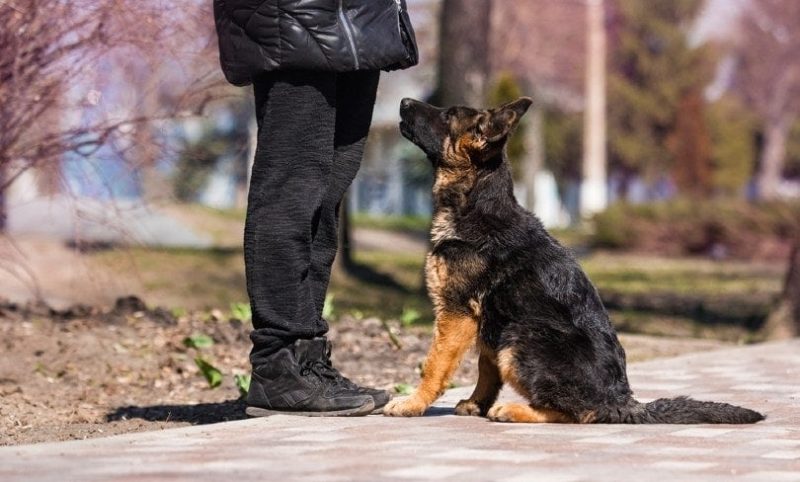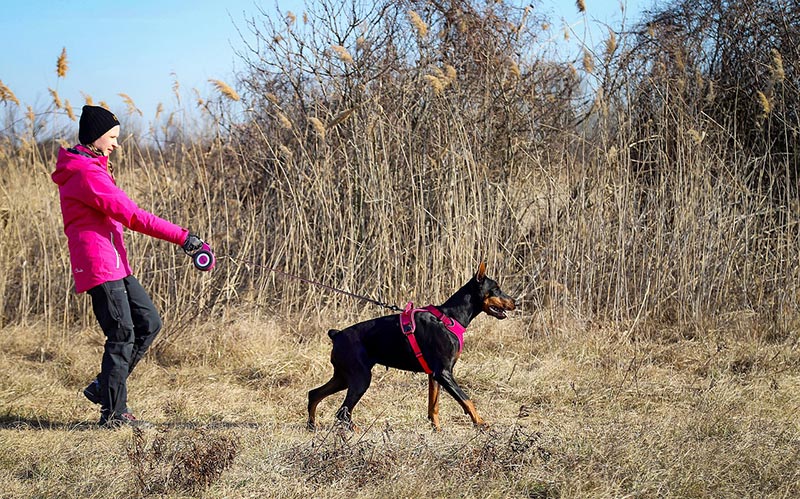What Is Dog Culture Like In Germany? Interesting Country Facts

Updated on

If you’re a pet lover planning a trip with your furry friend, researching the culture surrounding pet ownership and the rules of the country that involve pets is essential to ensure you and your pet have the best experience possible. This article will dive into the culture surrounding dog ownership in Germany, including what place they have in German society, how welcome they are in the cities and country at large, and what rules and regulations you might need to consider when you arrive.
Traveling to Germany With A Dog
When you make your way to the country, you must follow a few rules if you plan to take your pup. Like other EU countries, bringing your dog into Germany involves a vaccination record and a pet passport, which your veterinarian can usually issue for a fee.
The official customs website details that three points must be followed for you to bring your dog into Germany:
- Dogs entering must have either a microchip or a tattoo to identify them (tattooing is often done to racing dogs like Greyhounds) and be 15 weeks old or more.
- Dogs must be fully vaccinated against rabies.
- Owners must have valid documentation from their veterinarian showing both the microchip number or tattoo number and rabies vaccination status.
There is slightly more to do if you’re traveling from a country in which rabies status is not as well known, such as India, Thailand, Egypt, Morocco, or Tunisia. Dogs from those countries will need a blood test certifying that they are rabies-free and have these results printed in their veterinary documentation before travel.

How Many Dogs Can I Bring With Me?
Germany only allows up to five dogs to enter the country with any one person.
What Happens If I Don’t Have Documentation and Bring My Dog Anyway?
Bringing your dog to Germany (or any EU country) without the correct certifications and documents is a terrible idea. In the best case, your dog could be deported back to their home country or be held in quarantine (usually for several months). At worst, they could be destroyed at the owner’s own expense. So, get that certification sorted before you travel!
How Do People Treat Dogs in Germany? Are They Welcome?
Dogs are a significant part of German life, and they’re welcomed almost everywhere. 10.7 million dogs¹ are owned by German families across the country, and they are accepted in shops, parks, restaurants, and cafes, but it’s always best to ask an employee if dogs are allowed. There are certain places dogs typically aren’t allowed, such as government buildings, but there will be signs denoting where a pup can and can’t go.
People expect dogs to be polite, well-trained, and well-looked after. This promotes a dog-friendly atmosphere that focuses on the relationship between the dog and owner and the dog’s welfare. This means that it’s not uncommon to see a dog on the subway or sitting at the foot of a bar stool.
Animal welfare is a big deal in the country, with rules in place for the confinement of animals in crates (including dog crates) and how many hours dogs should be exercised a day. Germans consider dogs an integral part of their lives and recognize the animal’s need for companionship.

The Rules and Regulations of Dog Ownership in Germany
In some countries, owning a dog can be as easy as picking one up from a friend or breeder. In Germany, everything from where they are kept, how they are acquired, and even how well they behave is regulated to promote good welfare. They have taxes and insurance that need to be paid and mandatory training classes in some states.
This section of the guide will look at what rules and regulations affect dogs in Germany and if they apply to those visiting from overseas.
The Dog Tax
Each German state will have a dog tax (Hundsteuer) that varies from place to place. Each time a dog is purchased in the country, the new owners will have to register the dog in the local tax office and investigate how much the tax will be, which varies from area to area (such as differences in Berlin and Hamburg, for example).
The idea behind the dog tax is two-fold. First, it is to provide revenue for essential services that maintain the city where dogs live, such as green spaces and garbage cleanup.
Secondly, the dog tax is supposed to be steep enough to prevent people from owning too many dogs. Each additional dog you purchase in Germany is subject to a larger tax, which means that owning three dogs will cost a lot more than owning one. Again, this is designed to discourage the irresponsible ownership of dogs, which could ultimately affect their welfare.
How Much Is Dog Tax?
Each city and state charges its own amount for dog tax, although the amount is capped at €150 (around $160). For example, Hamburg has information on their website that states that it costs €90 per year for dogs over 3 months old and €600 for dogs deemed dangerous. The tax is paid in halves bi-annually.

Who Pays For Dog Tax?
All citizens who live in Germany and own a dog will need to pay the dog tax if their area requires it. Most do, and although the amount is usually on the lower side, this increases with each subsequent dog owned. People traveling through Germany will not have to pay dog tax, provided they’re staying for tourism purposes and don’t plan on living in the country. Certain dogs won’t be taxed, such as if they have a specific job or support role. The list of dogs not taxed in Germany includes the following:
- Support dogs, including guide dogs, if the owner has sufficient documentation
- Animals adopted from shelters in certain cities (Berlin gives one year’s tax-free ownership if the dog is adopted from a shelter, for example)
- Residents on unemployment benefits who prove the taxation will make cause them financial hardship
- Hunting dogs
- Police or sniffer dogs
Dog Insurance
Since all dogs are registered in Germany, most cities will require your dog to be insured. This insurance isn’t what we immediately think of when thinking about pet insurance; it’s insurance for the public’s protection, not your dogs. Public liability insurance is a requirement for dog owners in Germany, as it ensures any damage caused by a dog can be repaid swiftly and in full.
There are different requirements for different breeds, which can, in turn, vary from region to region, so if you plan on taking an extended stay in the country, check the needed requirements before traveling.

Where Can You Take Your Dog In Germany?
Germany has many dog-friendly, open areas for the whole family to visit. As stated previously, dogs are welcome in most locations on the German high street, including shops, restaurants, subways, and more. The notable exception is supermarkets, but everywhere else is generally dog-friendly and happy to have you visit with your pup. Many hotels in the country are dog friendly too, but check before you travel as some charge a small fee for pets.
Outdoor spaces are almost always dog-friendly, including parks like the off-leash Grunewald Forest park and beaches like Sylt island¹ in northern Germany, which offers 17 beaches designated for dogs!
Can You Take Your Dog Off-Leash?
There are strict leash laws in Germany, which unfortunately means dogs need to be leashed in all public spaces. This is somewhat contrary to what many people visiting the country may see when they’re out and about, however, as there is always a large number of dogs walking around off-leash with their owners. So, why is this? A special dog handler’s license (Hundeführerschein) allows dogs to be walked off-leash once owners prove that their dog has been given the attention, time, and training to enable it to roam free. Most places ask that all dog owners, regardless of license, leash their dogs when two people approach.

In Conclusion
Dog culture in Germany is one of rules and regulations for the common good: to ensure the dogs that live there have the highest standard of living and can enjoy their owner’s company in most areas. There are taxes and insurance policies to consider that are used to encourage responsible pet ownership and prevent suffering as much as possible. They have incentives for adopting pets and have many places across the country that can provide fun hours for you and your pup. The travel requirements for dogs coming into Germany are clear and are best prepared well in advance of travel.
Featured Image Credit: Nicky Rhodes, Shutterstock













